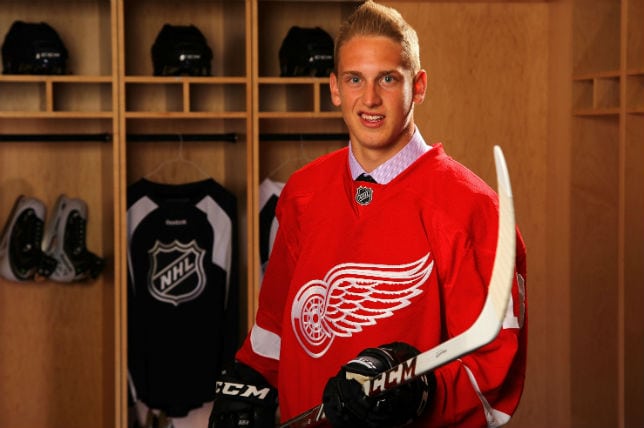
Red Wings prospect Mantha taking classes in NHL's School of Hard Knocks
Anthony Mantha is learning that the path to the NHL is not always a direct one. After starring in junior hockey, Mantha had struggled in his first year in the minors and continues to be a work in progress.
 Red Wings prospect Mantha taking classes in NHL's School of Hard Knocks
Red Wings prospect Mantha taking classes in NHL's School of Hard KnocksTRAVERSE CITY, Mich. – This time last year, there was a real possibility Anthony Mantha would be one of the few players who would make the jump to the Detroit Red Wings out of junior hockey. Now nobody’s sure if that jump will even take place this season.
None of this should come as a surprise. The Red Wings have always preferred to let their prospects over-ripen in the American League and it’s a philosophy that has served them well. No team has produced NHL-ready prospects out of the minors the way the Red Wings have over the past decade. Even when the prospect is a tantalizing 6-foot-5 and has a sublime skill level and a nose for the net, these things take time.
Mantha probably never thought he’d be back at the Red Wings Prospect Tournament this fall. But there he was slugging it out with other Detroit prospects, back at the place where his rocky first season of professional hockey brought him his first major setback. It was at the tournament in 2014 that Mantha broke his tibia, which took him out of main camp with the Wings and started his course to the minors.
“It was just bad luck,” Mantha said. “It’s just part of hockey. You don’t always choose where you’re going to be and when you’re going to get there. You just be ready and play your game.”
Mantha learned the same lesson so many before have had to learn on their way to the NHL. The jump from junior hockey to the AHL is far bigger than most people realize. Most scouts, in fact, claim it’s the biggest adjustment a player is going to have to make in his career. Mantha was not immune to the struggles many young players, particularly ones who have experienced a lot of success, endure trying to make that jump into pro hockey.
Two years ago, Mantha was one of the most dynamic scorers in junior hockey and was a star in the Memorial Cup. He could have been excused for thinking things might come easily to him. But his first year pro was the polar opposite of his last year of junior. In his last season of junior, he scored 130 points and 34 more in the playoffs. Last season, he scored just 33 points and four in 16 playoff games.
“Lots of ups and downs,” Mantha said. “For sure that injury pushed me back a few months, but I came back after that and tried to impress and play my game. I learned a lot last season. I learned the way pros play, I learned what they want from me, little details that I didn’t know before that I know now.”
It didn’t help that after the season, Red Wings senior vice-president Jim Devellano publicly called Mantha out. When asked how the Red Wings viewed Mantha’s first season of pro, Devellano said the organization was, “very, very, very disappointed,” in the way he played in 2014-15. It was a comment that probably didn’t help the situation, but Devellano would not have said it had it not been the way the organization truly felt. For his part, Mantha took the high road. He hasn’t spoken to Devellano about it and doesn’t intend to let it bother him.
“That’s in the past, that’s over,” Mantha said. “We were in playoffs at the time and I talked about it with Blash (new Red Wings coach Jeff Blashill, who was Mantha’s coach in the minors last season). We tried to just ignore it and play my game. That’s what I did and that’s what I keep doing.”
The fact that Mantha has a year already under Blashill certainly won’t hurt, but it’s difficult to see where he fits in the lineup. He’ll have a difficult time supplanting anyone in the Red Wings top three lines and the fourth line already has Luke Glendening between Drew Miller and Landon Ferraro penciled in. And that’s without including Tomas Jurco, Teemu Pulkkinen and fellow prospect Dylan Larkin. The way the Red Wings see it, having Mantha establish himself as an impact player in the AHL is better than having him see spot duty on the fourth line in the NHL.
“For me, it’s a fresh start,” Mantha said. “I’m here focused and trying to impress. I’d like to play maybe eight exhibition games, then 10 games, 20 games, 30 games, I don’t know. My goal is to play the whole season up there, but you never know what the future holds.”

